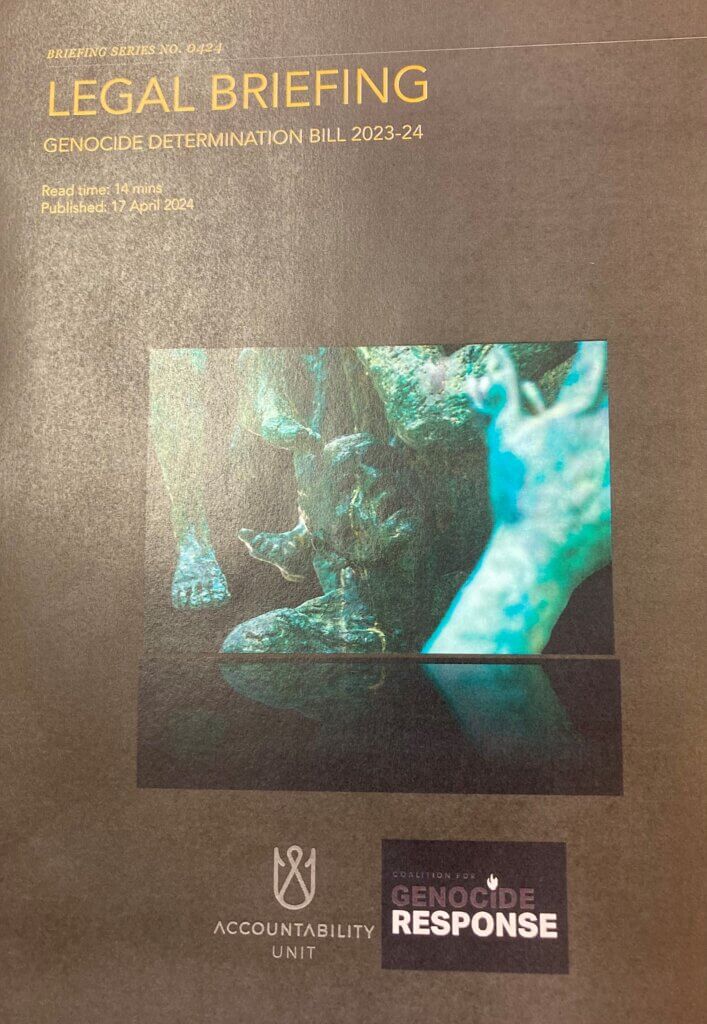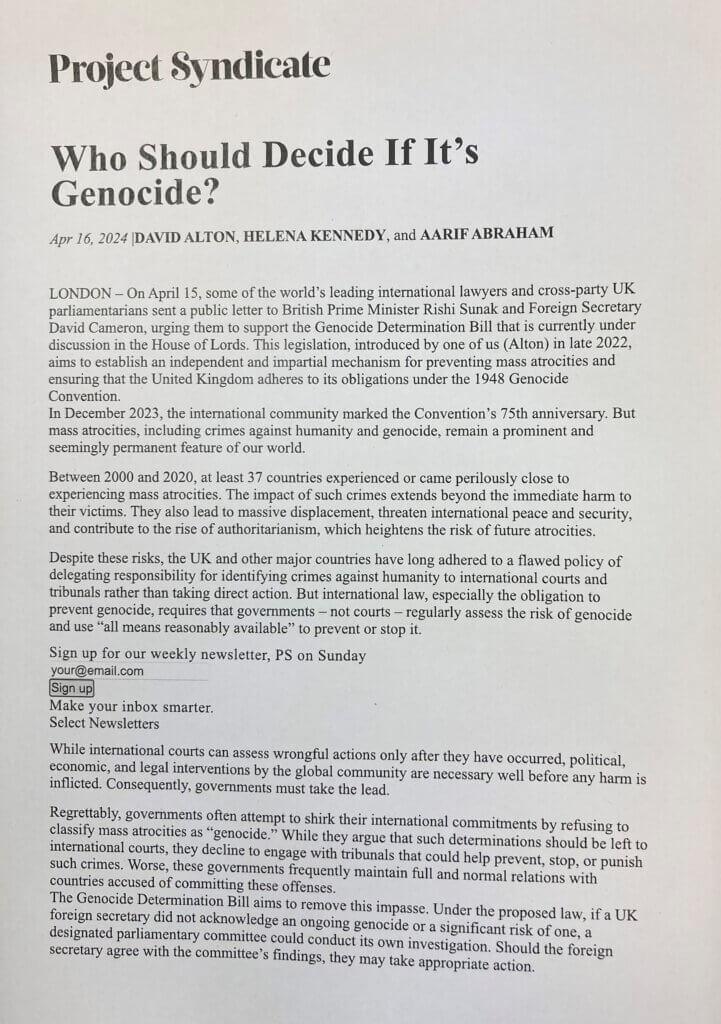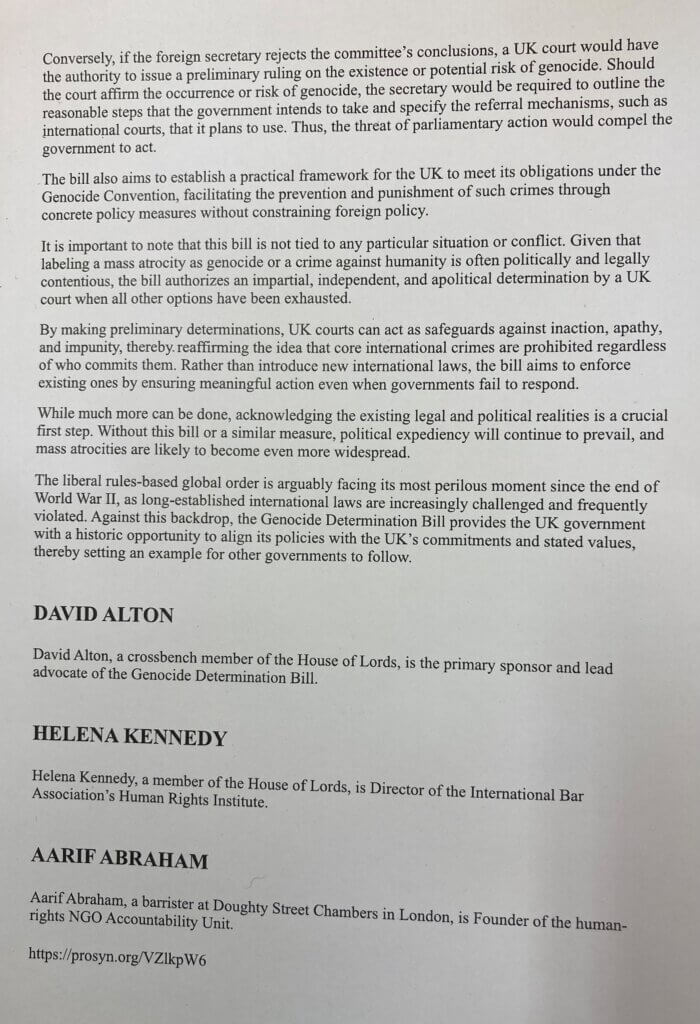Stop Perpetrators Getting Away With Genocide – Public Letter sent to the UK Prime Minister and Foreign Secretary on the Genocide Determination Bill 2023-24. The letter was published this morning, 17 April 2024, 06:00 am UK time.
The definitive online link to the public letter and signatories is available here: (New signatories will be recorded in the online link). Letter to UK Prime Minister and Foreign Secretary on the Genocide Determination Bill 2023-24 — Accountability Unit
The online link to the Legal Briefing Paper on the Genocide Determination Bill 2023-24 is available here: 17.04.2024 – Legal Briefing – Genocide Determination Bill 2023 – Final (squarespace.com). (Published by Accountability Unit & the Coalition for Genocide Response)
The Rt. Hon. Rishi Sunak MP
Prime Minister of United Kingdom
of Great Britain and Northern Ireland
10 Downing Street is SW1A 2AA
The Rt. Hon. Lord Cameron of Chipping Norton
Secretary of State for Foreign,
Commonwealth and Development Affairs
King Charles Street London SW1A 2AH
15 April 2024
Dear Prime Minister, Foreign Secretary,
Public Letter – Support for the Genocide Determination Bill 2023-24
On 9 December 2023, the international community marked the 75th Anniversary of the
Convention on the Prevention and Punishment of the Crime of Genocide (Convention).
The occasion was deeply solemn, given that genocides and other mass atrocity crimes
have claimed the lives of over 80 million victims globally since 1945. Today, the very
existence of several protected groups – including but not limited to the Rohingya in
Myanmar, the Yazidis in Iraq/Syria, and the Uyghurs in China – is threatened by ongoing
prohibited acts including murder, torture, rape and sexual violence, prevention of births,
and forced starvation.
In this anniversary year, we see the proposed Genocide Determination Bill (Bill) as a
historic opportunity for the United Kingdom to demonstrate global leadership by utilising
all means that are reasonably available to it (including diplomatic, economic and consular)
to prevent governments and non-state actors from attempting to destroy protected
groups, in whole or in part, from the rich tapestry of the human community.
The Bill would provide for the Senior Courts of the UK to make preliminary determinations
as to what constitutes genocide in accordance with the UK’s obligations under the
Convention. It would also introduce a referral mechanism for such determinations to be
referred to relevant international courts or mechanisms.
A preliminary determination or referral would only be permitted following a response of
the Secretary of State to formal findings of a relevant committee, of either House of
Parliament, stating that there is a serious risk of genocide or that genocide is being, or
has been, committed outside the UK.
The UK has in the past five years attempted to play a key international role in protecting
civilians from egregious human rights violations, including the spearheading of a global
campaign to bring Da’esh/ISIS to justice for its genocidal crimes against the Yazidis in
northern Iraq; supporting efforts to prevent the serious risk of genocide in Ukraine and
using international fora to raise awareness of the plight of the Uyghurs. Support for this
Bill represents a strong continuation of such commitments to universal human rights, in
accordance with the UK’s critical standing as a permanent member of the UN Security
Council.
The UK has a long-standing policy that genocide be legally determined in a court of law,
an independent and impartial mechanism which safeguards against politicisation and
vexatious claims. The Bill addresses any concerns that the courts should not have power
to curtail decision making by a sovereign parliament by ensuring that any determination
can only be triggered by Parliament itself and, in any event, after a Government response.
The Bill is clear that, following preliminary determination of genocide by a Senior Court,
the Government ultimately decides on all consequences, in line with international law,
subject to Parliamentary scrutiny.
The Bill allows UK domestic courts to fill a gap in the international justice system, since
international courts cannot guarantee consequential action in time to prevent further
atrocities as mandated by the Genocide Convention. For non-governmental
organisations, a court ruling on the existence of genocide, or of a situation where there is
a serious risk of genocide being committed, would, in itself, enhance human rights
advocacy and strike a meaningful blow against perpetrators. Moreover, the establishment
and effective implementation of a national atrocity prevention strategy would ensure that
the UK complies with its own obligations under the Genocide Convention.
As the Government seeks to play a more meaningful and pro-active role in atrocity
prevention and in maintaining international peace and security, parliamentarians have a
historic opportunity to ensure that future policy truly reflects the UK’s moral commitments
and values.
Signatories [alphabetical order by surname]
Dr. Payam Akhavan OOnt FRSC –
Professor of International Law, Human
Rights Chair and Senior Fellow, Massey
College, University of Toronto
Rt. Hon. Prof. Lord David Alton, KCSG,
KCMCO – former MP 1979-1997, former
Professor of Citizenship; Member of the
House of Lords (Crossbench)
Rt. Hon. Lord David Blencathra –
Member of the House of Lords
(Conservative)
Rt. Hon. Lord Browne – former Secretary
of State for Defence; Member of the
House of Lords (Crossbench)
Toby Cadman – Barrister; Joint Head of
Chambers, Guernica 37 Chambers
David Campanale – Journalist,
Broadcaster, Producer
Leto Cariolou – Co-Counsel, Kosovo
Specialist Chambers; Barrister, Garden
Court Chambers
Rt. Hon. Baroness Caroline Cox –
Member of the House of Lords
(Crossbench)
Stephen Cragg KC – Barrister, Doughty
Street Chambers
Prof. David M. Crane – Founding Chief
Prosecutor, UN Special Court for Sierra
Leone
Rt. Hon. Baroness Frances D’Souza CMG
Member of the House of Lords
(Crossbench)
Luke de Pulford – Executive Director,
Inter-Parliamentary Alliance on China
(IPAC)
Yonah Diamond, Esq. – Senior Legal
Counsel, Raoul Wallenberg Centre for
Human Rights
Prof. Max du Plessis SC – Barrister,
Doughty Street Chambers; London;
Adjunct Professor; University of Cape
Town, and Nelson Mandela University
Dr. Tatyana Eatwell – Barrister, Doughty
Street Chambers
Dr. Mark Ellis – Executive Director,
International Bar Association
Dr. Leyla Ferman – Senior Board Member,
Women for Justice; Co-Founder, Yazidi
Justice Committee
Rt. Hon. Baroness Ilora Finlay – Member
of the House of Lords (Crossbench)
Kate Gibson – Counsel, International
Criminal Court; Associate Tenant, Doughty
Street Chambers
Kip Hale – Chief of Staff, Atrocity Crimes
Advisory Group for Ukraine & Georgetown
Law’s International Criminal Justice
Prof. Rebecca Hamilton – Professor of
Law, American University Washington
College of Law
Rt. Hon. Lord David Hannay – former UK
Ambassador to the United Nations;
Member of the House of Lords
(Crossbench)
Mia Hasenson-Gross – Executive Director,
René Cassin – the Jewish voice for human
rights
Rt. Hon. Baroness Arminka Helić –
Member of the House of Lords
(Conservative)
Susie Hughes – Executive Director,
International Coalition to End Transplant
Abuse in China (ETAC)
Amb. (ret.) Stephen J. Rapp – former US
Ambassador-at-Large for Global Criminal
Justice; Fellow of Practice, Oxford Institute
of Ethics, Law, and Armed Conflict
Wayne Jordash KC – Managing Partner,
Global Rights Compliance
Rt. Hon. Baroness Helena Kennedy LT
KC – Director, International Bar Association
Human Rights Institute; Member of the
House of Lords (Labour)
Prof. Rianne Letschert – Professor of
International Law and Victimology,
Maastricht University
Rt. Hon. Baroness Ruth Lister – Member
of the House of Lords (Labour)
Dr Wei Liu – Chair, UK Falun Dafa
Association
Nicola Macbean – Executive Director, The
Rights Practice
Rahima Mahmut – UK Director, World
Uyghur Congress; Executive Director, Stop
Uyghur Genocide
Dr. Jason McCue – Senior Partner, McCue
Jury & Partners
Rachel Miner – Founder and CEO,
Bellwether International
Rt. Hon. Lord John Edward Hollister
Montagu – The Earl of Sandwich; Member
of the House of Lords (Crossbench)
Rt. Rev. Philip Mounstephen – Member of
the House of Lords; Bishop of Winchester
Rt. Hon. Brendan O’Hara MP – MP for
Argyll and Bute; SNP Spokesperson for
International Development
Rt. Hon. Baroness Nuala O’Loan DBE
MRIA – Member of the House of Lords
(Crossbench); First Police Ombudsman
Dr. Ewelina Ochab – Programme Lawyer,
IBAHRI; Co-Founder, Coalition for
Genocide Response
Prof. Mathilde Philip-Gay – Professor of
International Law; Lyon Chair of Human
and Environmental Rights
Michael Polak – Barrister, Church Court
Chambers; Director, Justice Abroad;
Committee Member, Stop Uyghur
Genocide
Dr. Javaid Rehman FHEA, FRSA, FAcSS –
Professor of Muslim Constitutionalism and
Human Rights Law, Brunel University,
London
Geoffrey Robertson KC – Barrister;
Founding Head of Chambers, Doughty
Street Chambers
Ben Rogers – Co-founder and Deputy
Chair, Conservative Party Human Rights
Commission
Dist. Prof. Wendy Rogers, BM.BS,
FRACGP, PhD, FAHA – Professor of
Clinical Ethics, Macquarie University; Chair,
International Advisory Committee of the
International Coalition to End Transplant
Abuse in China
Aarif Abraham – Director, Accountability
Unit; Barrister, Doughty Street Chambers
Prof. William A. Schabas OC MRIA –
Professor of International Law, Middlesex
University
Rupert Skilbeck – Director, REDRESS
Prof. Rt. Hon. Baroness Julie Elizabeth
Smith – Defence Spokesman, Liberal
Democrat; Member of House of Lords
(Liberal Democrat)
Prof. Jennifer Trahan – NYU Center for
Global Affairs; Convenor, The Global
Institute for the Prevention of Aggression
Rt. Hon. Baroness Janet Whitaker –
Member of the House of Lords (Labour)
Rt. Hon. Lord Michael Wills – Member of
the House of Lords (Labour)
[END]

The online link to the Legal Briefing Paper on the Genocide Determination Bill 2023-24 is available here: 17.04.2024 – Legal Briefing – Genocide Determination Bill 2023 – Final (squarespace.com). (Published by Accountability Unit & the Coalition for Genocide Response)




